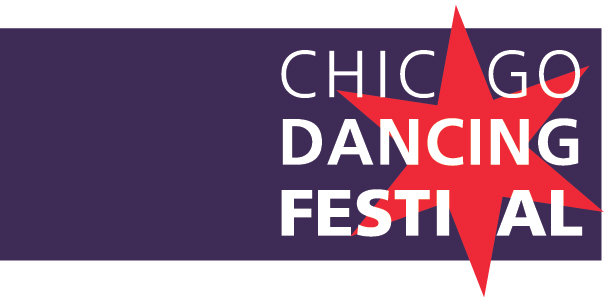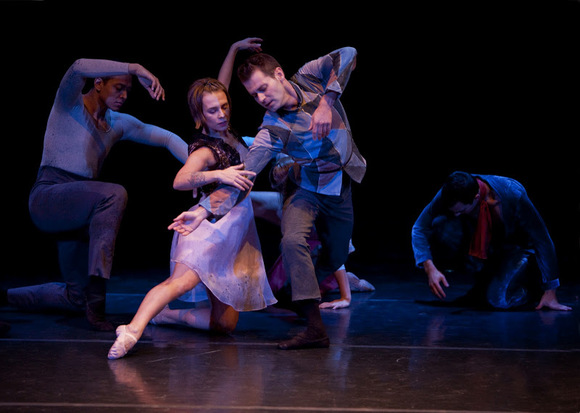| « Elysium, We're the Millers, Planes, The Spectacular Now & Lovelace | The Curious Case of Vivian Maier's Copyright » |
Dance Mon Aug 12 2013
Dancing & Diversity: Chicago Dancing Festival

Chicago's summer festival season continues to roll along--and next week, August 20-24, it dances along with the Chicago Dancing Festival, a five-day showcase featuring performances by top local and national dance companies. Co-produced by choreographer Lar Lubovitch and dancer Jay Franke, this diverse, "free-to-all festival," now in its seventh year, will not only be spread across various venues like the Auditorium Theatre of Roosevelt University, Harris Theater for Music and Dance, Museum of Contemporary Art and the Pritzker Pavilion in Millennium Park; it will also feature various dance styles including ballet, modern, rhythmic, and more.
This year, the festival's dance card is filled with Chicago staples such as Chicago Human Rhythm Project and Hubbard Street Dance Chicago, and newcomers to the festival include Ensemble Español Spanish Dance Theater and Chicago's Natya Dance Theatre.
I recently spoke with Franke about the festival, its diversity, and what makes Chicago's dance community special.
The festival is now in its seventh year; how would you say it has grown or changed over the years?
We are in year seven and we are back with a vengeance. Generally speaking, we've been able to expand our audience and we've been adding new venues and new opportunities for people to see dance for the first time, or, maybe they're long time dance lovers. We've been able to expand from our first year which was one performance to now, five days of free programming for Chicago dance lovers.
There is a very diverse array of dance styles in the lineup--what went into choosing the dance companies who will participate in the festival?
My co-founder and co-director, Lar Lubovitch and I, always look for the best we could find. We try to assemble programs based on many things; diversity is definitely a component but more importantly, what's important to us is that we're showing the best. So if it's an African dance company, well we just happen to have Muntu in Chicago or if it's a tap company, we have the Chicago Human Rhythm Project, or if it's a modern dance company, it might be Alvin Ailey from New York. We really strive to present the best we can to our audience just so they cam have a firsthand experience with dance.

Lar Lubovitch Dance Company - Transparent Things; Photo by Rose Eichenbaum.
So dance companies don't exactly audition or apply--you seek them out...
Yes. And every year, we start with a clean slate in a way; we have venues lined up and we know we can reach an audience of 15 to 16 thousand people and say "What do we want them to see?" or "What is interesting to us right now?" And we're constantly out experiencing different things and seeing companies and dancers and studio performances, so we have our fingers on the pulse of what's happening. So with that in mind, we then start to assimilate a program based on what we want and believe me, we have a lot of wonderful, talented companies that contact us every year that want to be a part of the dancing festival and who want to perform in Chicago. But sometimes, it's just not the right fit for them for that year. It really just comes down to us putting together these different programs where we might say, "Well we've got these three big companies on this program and then we want a duet, and now we want a solo, and then we go out and look for a solo or a duet. But it really comes from us.
As an integral part of Chicago's dance community, how would you describe the city's place or status in the world of dance?
I think that we have a growing and thriving dance community. When I first came to Chicago from New York 16 years ago, I found it to be as much of a dance audience here as there is in New York. I hate to compare it to New York, but I also think we have something very special and unique with the diversity of companies that call Chicago home--I think that's important. I also think we have something that many cities don't' have which is a mayor who loves dance. We have a culture in Chicago that really loves the arts and that lends itself to dance, especially with the Chicago Dancing Festival.
What do you want the various audiences to take away from the festival?
If they've never seen dance before, I want the Chicago Dancing Festival to be one of their first dance experiences because I think each program is really well diversified and they will take away something from every program. So maybe they're not a classical ballet lover--maybe they like contemporary dance or Indian dance--I don't know, but I want them to come and have that [experience]. We give them an arrangement of different opportunities so they leave feeling like they've had something and hopefully, they will then turn around and buy a ticket and come back and see more dance in Chicago. And for the real dance lovers, I challenge them all to bring people who don't know much about dance to the festival because I think it's a great opportunity for all of us in Chicago to help cultivate a new community of dance lovers.
The complimentary, general seating tickets for all indoor performances at the Chicago Dancing Festival are currently 'sold out'; however, tickets that are unclaimed 15 minutes prior to each show will be released in a "stand-by" line that begins one hour before each performance (must be present). There are no ticket requirements for the festival's grand finale outdoor performance, "Celebration of Dance," which will be held at the Pritzker Pavilion, Saturday, August 24. For more information, including the festival's full lineup, visit the website or call 773-609-2335.
NOTE: The tickets for the Aug. 21 fundraising performance and benefit, "Solitaire - A Game of Dance, which will be held at the Museum of Contemporary Art, are $250 and can be purchased by email: info@chicagodancingfestival.com. Space is limited.








